Northern Chords Festival, Church of St James and St Basil, Newcastle review - high, lucid and bright | reviews, news & interviews
Northern Chords Festival, Church of St James and St Basil, Newcastle review - high, lucid and bright
Northern Chords Festival, Church of St James and St Basil, Newcastle review - high, lucid and bright
From bouncy Haydn mass to Mendelssohn in chorale mode, a day of great performances
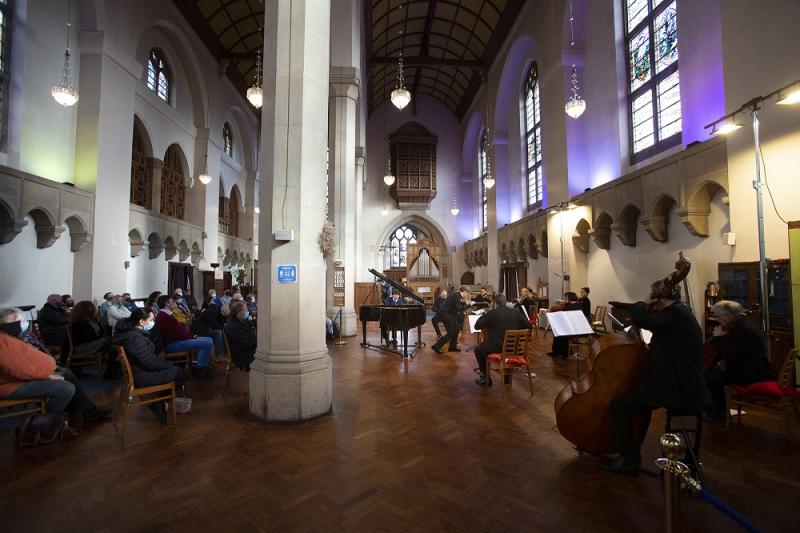
Whatever happens next – and even in Tier 3 the Royal Liverpool Phlharmonic goes on playing to carefully distanced audiences – this will be remembered by all participants as a day of dazzling brilliance, its bright autumn light matched by so much of the music in a morning service and four concerts ending nine hours later.
In the best (and shortest) of sermons flanked by the mostly buoyant settings of Haydn’s Nicolaimesse, the vicar of the light, airy church of St James and St Basil in the leafy Newcastle suburb of Fenham, James McGowan, made everyone beam by investing Jacinda Ardern as the very model of a compassionate leader, the resident saints and all the musicians involved with a trinity of virtues: honesty, authenticity and vulnerability. Energy would also figure here, above all in the incredible hard work of Northern Chords Festival director, programmer, conductor and cellist Jonathan Bloxham. Vitally, he felt, it gave the locals not only joy but also the confidence to attend life-affirming events such as this.
It’s impossible not to love the church, its well-tended garden and its welcoming hall, carefully reopened for the first time in months, with a further resource in the nearby wide open spaces of what’s called the Town Moor where cattle still graze. The unusual dedication bears the names of a local ship merchant’s two sons, James and Henry (known as Basil) Knott, whose grief-stricken father had the church built to commemorate their loss in World War One. All of a piece in its 1928-31 Arts and Crafts simplicity, light floods in through the delightful windows depicting all the nature featured in Psalm 104, and the woodwork of the organ casing adds a Moorish-Islamic touch. The lively acoustic will be mitigated by the installation of a £13,000 sound system and with its tradition of regular concerts the church also raised £25,000 for a Kawai grand, sounding richly various in the masterful hands of Martin James Bartlett and Daniel Lebhardt. 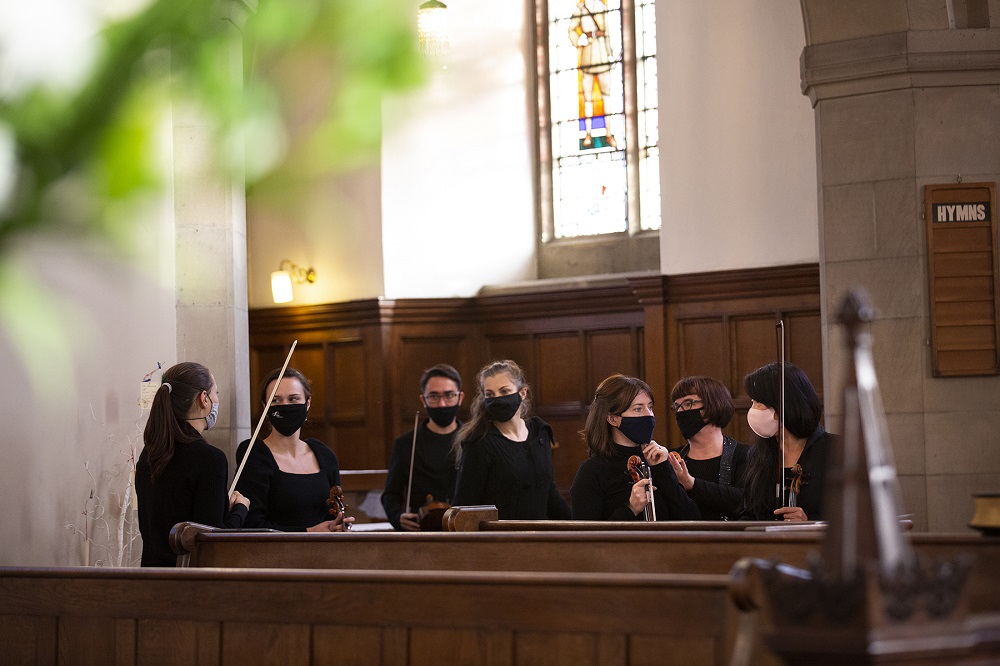 Have you ever heard a Haydn mass in the context of a church service? I hadn’t, until Sunday, and though I’ve participated in the likes of Byrd masses this way, the bracing cheerfulness of the master’s early Missa Sancti Nicolai, appropriately cast for the name-day of patron Prince Nikolaus Esterházy, makes a big difference to the usually rather solemn business of a Sunday morning communion. Compared to the later masterpieces, it’s short too, getting through the texts in double quick time by occasionally superimposing them. If the only truly original thing in it are the Amens of the Gloria, Haydn does right by the necessary solemnity within the general jubilation, for the Crucifixion, and with the bracing upward scales for the Resurrection.
Have you ever heard a Haydn mass in the context of a church service? I hadn’t, until Sunday, and though I’ve participated in the likes of Byrd masses this way, the bracing cheerfulness of the master’s early Missa Sancti Nicolai, appropriately cast for the name-day of patron Prince Nikolaus Esterházy, makes a big difference to the usually rather solemn business of a Sunday morning communion. Compared to the later masterpieces, it’s short too, getting through the texts in double quick time by occasionally superimposing them. If the only truly original thing in it are the Amens of the Gloria, Haydn does right by the necessary solemnity within the general jubilation, for the Crucifixion, and with the bracing upward scales for the Resurrection.
It’s always specially thrilling at this time to hear a properly spaced-out choir, and the vibrant semi-professional Voices of Hope, a top-notch local group conducted by Mark Edwards (pictured below) which hadn’t sung together since last December, complemented Bloxham’s bright Northern Festival strings (many of them ready to go on pictured above, both images by Ian Cairns), led by rising star Benjamin Baker, a major soloist later on, and including many Northern Sinfonia players who only two days earlier had returned to the stage of the Sage Gateshead (but not, alas, to a full audience – people are still wary in Newcastle). 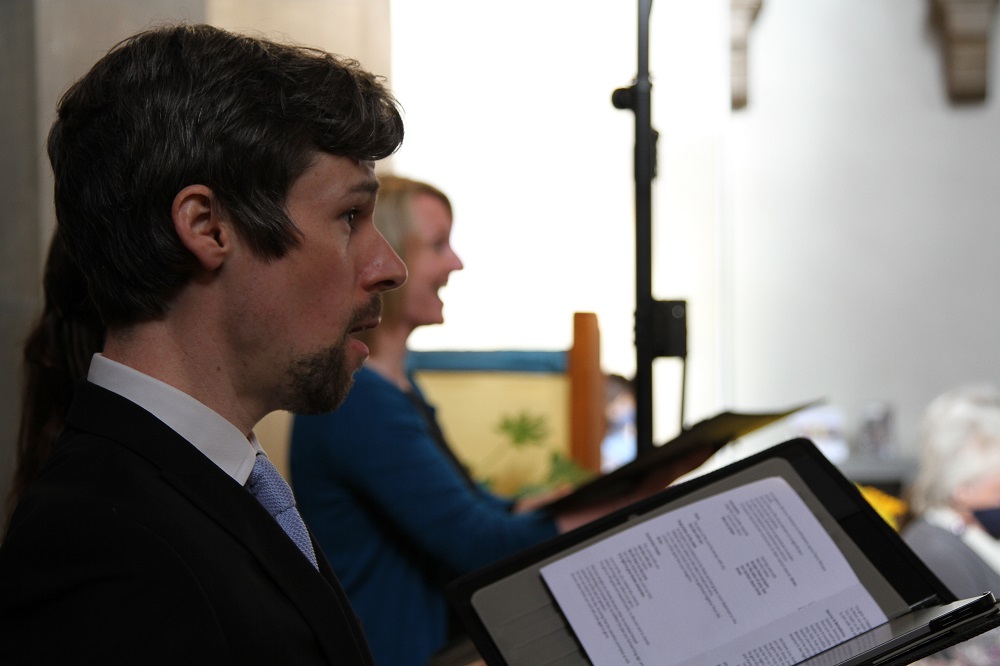
Repartee with Bloxham and the strings of Ignaz Lachner’s arrangement sparkled, the melancholy mood of the slow movement was duly respected, even if you suspect the young Mozart doesn’t quite feel it yet, and then of course there is the big surprise of the finale, ceasing its chatter for a slow and heavenly minuet, a novelty echoed in the even more ethereal counterpart of the third E flat Concerto, K482 (in that case the first appearance of clarinets in the concertos couldn’t be satisfyingly substituted by strings). 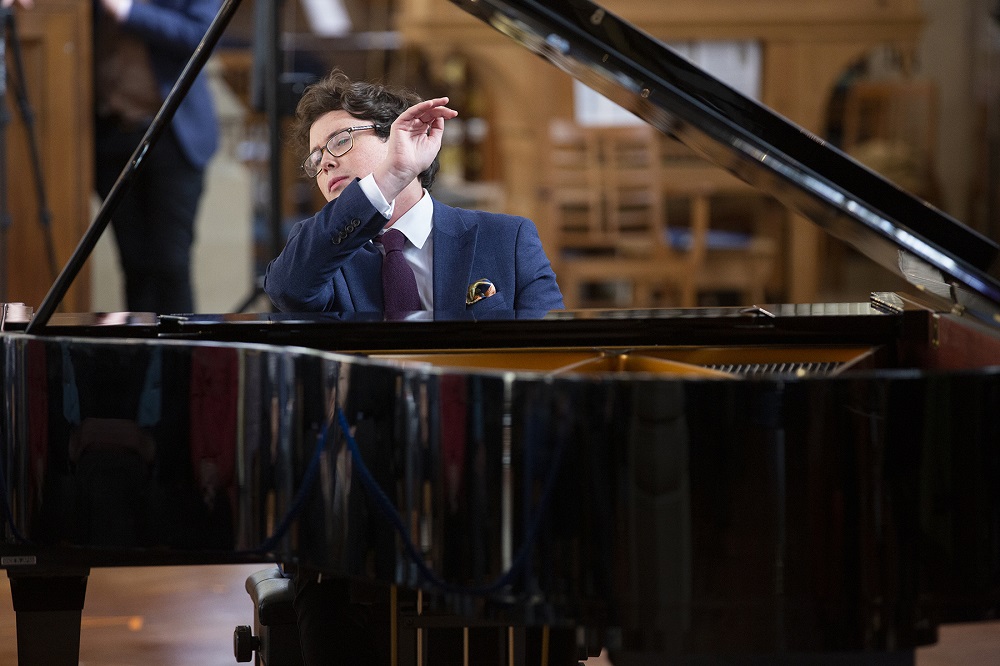 Oddly, the sublime continued with the encore, also in E flat – one of three Gershwin transcriptions we heard from Bartlett during the day, “The Man I Love”. Mozart and Gershwin, the great melodists – why ever not? In the evening concert, “Embraceable You” wasn’t immediately recognizable within the filigree of Earl Wild’s Lisztian transcendentalism, while “I Got Rhythm” was wild – like the first piece, the work of the composer, but not his standard version.
Oddly, the sublime continued with the encore, also in E flat – one of three Gershwin transcriptions we heard from Bartlett during the day, “The Man I Love”. Mozart and Gershwin, the great melodists – why ever not? In the evening concert, “Embraceable You” wasn’t immediately recognizable within the filigree of Earl Wild’s Lisztian transcendentalism, while “I Got Rhythm” was wild – like the first piece, the work of the composer, but not his standard version.
A vein of English pastoral and poetry ran through the day. Elgar’s Serenade for Strings came before the Mozart concerto, a rather more urgent performance than the equally valid and emotional one I heard from the City of London Sinfonia in Southwark Cathedral less than three days earlier, and Bloxham sparked extraordinary vibrancy, sustained and deepened by the church reverberation, in “The Rapture”, the third, dance movement of Finzi’s Dies Natalis. This is a work much less often heard than the Elgar in concert. It’s a strange inspiration, slightly diffuse in its ecstasy if you prefer the tighter rein of Britten (no favourite of Finzi’s), but Ben Johnson (pictured below by Martin Savage with Bloxham and Northern Chords players), outstanding interpreter of Britten’s Serenade, did full justice to the pointing of mystical texts from third century meditations and metaphysical poet Thomas Traherne which give mature voice to the infant Christ (a concept I can't help finding slightly creepy). 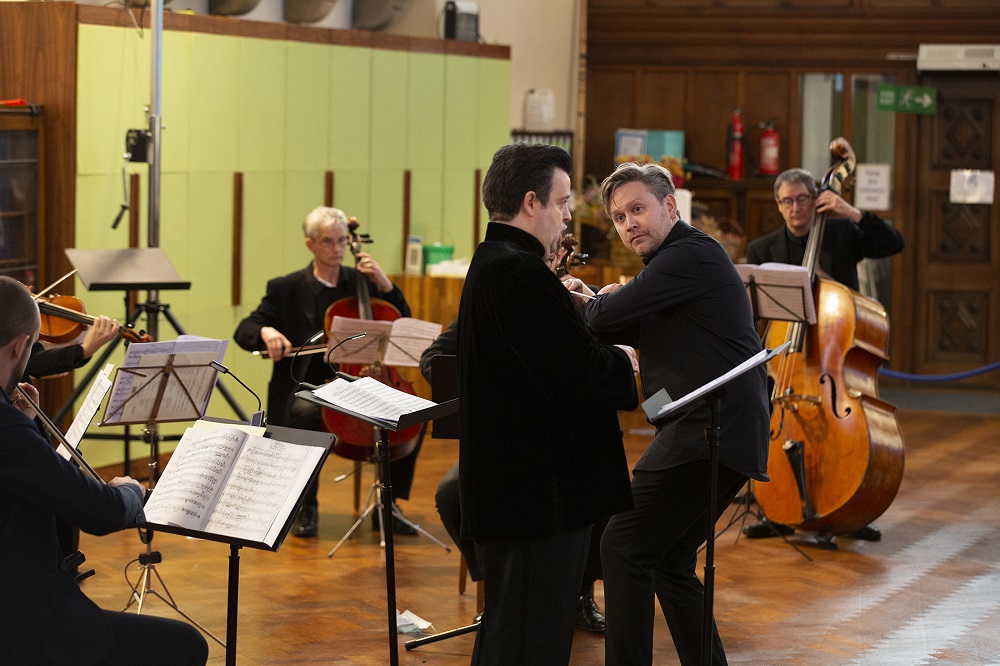 In Johnson's second contribution of the day, three Schubert songs to the moon – duly materializing half full to the side of the church later in the day (pictured below) – were sheer perfection, the tenor floating on a supportive cloud from Bartlett and a surprise culmination in the hallowed closing stages of “An der Mond in einer Herbsnacht” (“To the moon on an autumn night”), an Italo-German hybrid of exquisite sensitivity. It's also Johnson's Desert Island Schubert. Perfection hovered, too, over the Shakespeare settings shared with baritone Jonathan McGovern, fresh from his triumph in the Royal Opera's 4/4 spectacular, and Lebhardt, an equally responsive pianist. The revelation here was a late Vaughan Williams setting for two male voices and piano reflecting the brothers who mourn a supposed death in Cymbeline – “Fear no more the heat of the sun,” of course, where VW’s gift to be simple is at its best.
In Johnson's second contribution of the day, three Schubert songs to the moon – duly materializing half full to the side of the church later in the day (pictured below) – were sheer perfection, the tenor floating on a supportive cloud from Bartlett and a surprise culmination in the hallowed closing stages of “An der Mond in einer Herbsnacht” (“To the moon on an autumn night”), an Italo-German hybrid of exquisite sensitivity. It's also Johnson's Desert Island Schubert. Perfection hovered, too, over the Shakespeare settings shared with baritone Jonathan McGovern, fresh from his triumph in the Royal Opera's 4/4 spectacular, and Lebhardt, an equally responsive pianist. The revelation here was a late Vaughan Williams setting for two male voices and piano reflecting the brothers who mourn a supposed death in Cymbeline – “Fear no more the heat of the sun,” of course, where VW’s gift to be simple is at its best.
The mostly elegiac tone fitted the later afternoon programme of “music in times of pandemic” – Guillaume de Machaut, Black Death survivor, in an organ Sanctus as preface (played by Warren Smith), three tough perspectives from 1918 and Huw Watkins’ 2020 Arietta evolving from Arvo Pärt-like beginnings to something more personal within a short but memorable span. Baker and Lebhardt did this refined justice, but more troubling music came before it. I’ve never heard the first movement of Elgar’s Violin Sonata more embattled, while the violin-and-piano version of Lili Boulanger’s D’un matin de printemps is more unsettling and even anguished than it sounds in the diaphanous, impressionistic orchestration, performed by Bloxham and the Northern Chords Festival Orchestra at the 2019 Europe Day Concert in London’s St John’s Smith Square. 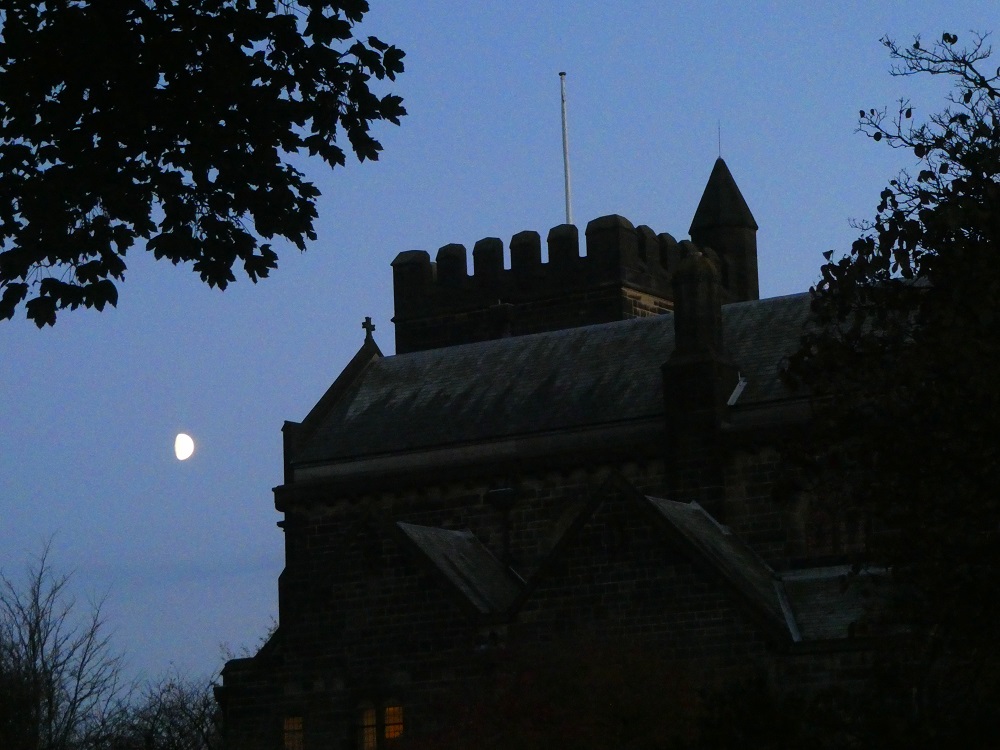
Gala concerts have been a regular feature of both the Northern Chords Festival and Johnson’s Southrepps Festival in a North Norfolk church every summer, featuring so many of the same artists. Getting the balance of show-offy fun with depth right is tricky, but this one worked. McGovern gave us two sad clowns, Leoncavallo’s Tonio in the Prologue of Pagliacci and lamenting Pierrot from Korngold’s Die tote Stadt, with Lebhardt once again giving supportive magic against which the baritone “died” on the most beautifully sustained soft note at the end. Bartlett's Gershwin treasures, as mentioned earlier, were perfect, and there was a rare case of the highly cultured Baker letting virtuoso rip in Paganini’s hilariously over the top solo-violin variations on Paisiello’s arietta “Nel cor più non mi sento,” twinned with an aria from Lehar’s Paganini; Johnson is one of the few who can pull off this sort of thing. (Pictured below: the final line-up: McGovern, Johnson, Bartlett, Lebhardt, Baker, Bloxham). 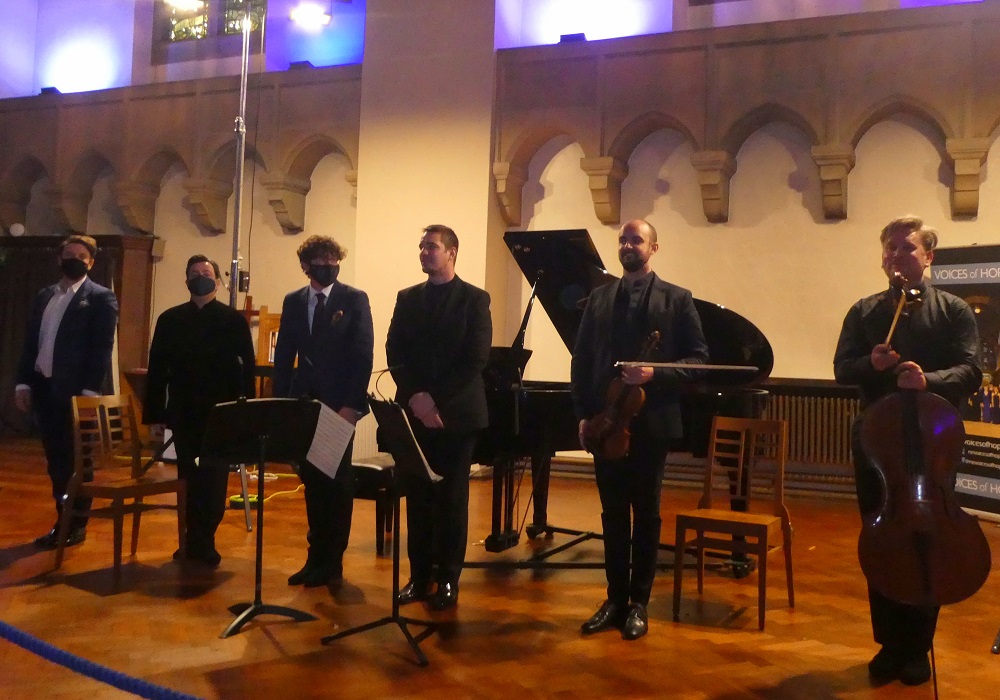
- Humble but much-viewed filming of events on the Facebook pages of Classic FM and Northern Chords
- Benjamin Baker plays in tonight's Wigmore Hall concert with Ben Goldscheider and Tom Poster, which can now be seen on YouTube
- More classical music reviews on theartsdesk
The future of Arts Journalism
You can stop theartsdesk.com closing!
We urgently need financing to survive. Our fundraising drive has thus far raised £49,000 but we need to reach £100,000 or we will be forced to close. Please contribute here: https://gofund.me/c3f6033d
And if you can forward this information to anyone who might assist, we’d be grateful.

Subscribe to theartsdesk.com
Thank you for continuing to read our work on theartsdesk.com. For unlimited access to every article in its entirety, including our archive of more than 15,000 pieces, we're asking for £5 per month or £40 per year. We feel it's a very good deal, and hope you do too.
To take a subscription now simply click here.
And if you're looking for that extra gift for a friend or family member, why not treat them to a theartsdesk.com gift subscription?
more Classical music
 Weilerstein, NYO2, Payare / Dueñas, Malofeev, Edinburgh International Festival 2025 review - youthful energy and emotional intensity
Big-boned Prokofiev and Shostakovich, cacophonous López, plus intense violin/piano duo
Weilerstein, NYO2, Payare / Dueñas, Malofeev, Edinburgh International Festival 2025 review - youthful energy and emotional intensity
Big-boned Prokofiev and Shostakovich, cacophonous López, plus intense violin/piano duo
 theartsdesk at the Three Choirs Festival - Passion in the Cathedral
Cantatas new and old, slate quarries to Calvary
theartsdesk at the Three Choirs Festival - Passion in the Cathedral
Cantatas new and old, slate quarries to Calvary
 BBC Proms: Estonian Philharmonic Chamber Choir, Kaljuste review - Arvo Pärt 90th birthday tribute
Stillness and contemplation characterise this well sung late-nighter
BBC Proms: Estonian Philharmonic Chamber Choir, Kaljuste review - Arvo Pärt 90th birthday tribute
Stillness and contemplation characterise this well sung late-nighter
 BBC Proms: Kholodenko, BBCNOW, Otaka review - exhilarating Lutosławski, underwhelming Rachmaninov
Polish composers to the fore in veteran conductor’s farewell
BBC Proms: Kholodenko, BBCNOW, Otaka review - exhilarating Lutosławski, underwhelming Rachmaninov
Polish composers to the fore in veteran conductor’s farewell
 theartsdesk at the Pärnu Music Festival 2025 - Arvo Pärt at 90 flanked by lightness and warmth
Paavo Järvi’s Estonian Festival Orchestra still casts its familiar spell
theartsdesk at the Pärnu Music Festival 2025 - Arvo Pärt at 90 flanked by lightness and warmth
Paavo Järvi’s Estonian Festival Orchestra still casts its familiar spell
 BBC Proms: Batsashvili, BBC Scottish Symphony Orchestra, Ryan Wigglesworth review - grief and glory
Subdued Mozart yields to blazing Bruckner
BBC Proms: Batsashvili, BBC Scottish Symphony Orchestra, Ryan Wigglesworth review - grief and glory
Subdued Mozart yields to blazing Bruckner
 Classical CDs: Hens, Hamburg and handmaids
An unsung French conductor boxed up, plus Argentinian string quartets and baroque keyboard music
Classical CDs: Hens, Hamburg and handmaids
An unsung French conductor boxed up, plus Argentinian string quartets and baroque keyboard music
 BBC Proms: McCarthy, Bournemouth SO, Wigglesworth review - spring-heeled variety
A Ravel concerto and a Walton symphony with depth but huge entertainment value
BBC Proms: McCarthy, Bournemouth SO, Wigglesworth review - spring-heeled variety
A Ravel concerto and a Walton symphony with depth but huge entertainment value
 BBC Proms: First Night, Batiashvili, BBCSO, Oramo review - glorious Vaughan Williams
Spirited festival opener is crowned with little-heard choral epic
BBC Proms: First Night, Batiashvili, BBCSO, Oramo review - glorious Vaughan Williams
Spirited festival opener is crowned with little-heard choral epic
 Interview: Quinteto Astor Piazzolla on playing in London and why Mick Jagger's a fan
Music Director Julián Vat and pianist Matias Feigin compare notes on Piazzolla
Interview: Quinteto Astor Piazzolla on playing in London and why Mick Jagger's a fan
Music Director Julián Vat and pianist Matias Feigin compare notes on Piazzolla
 Classical CDs: Bells, birdsong and braggadocio
British contemporary music, percussive piano concertos and a talented baritone sings Mozart
Classical CDs: Bells, birdsong and braggadocio
British contemporary music, percussive piano concertos and a talented baritone sings Mozart

Add comment